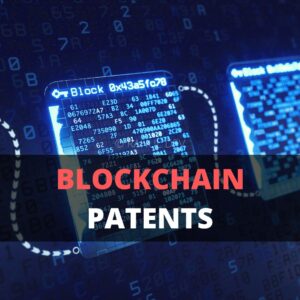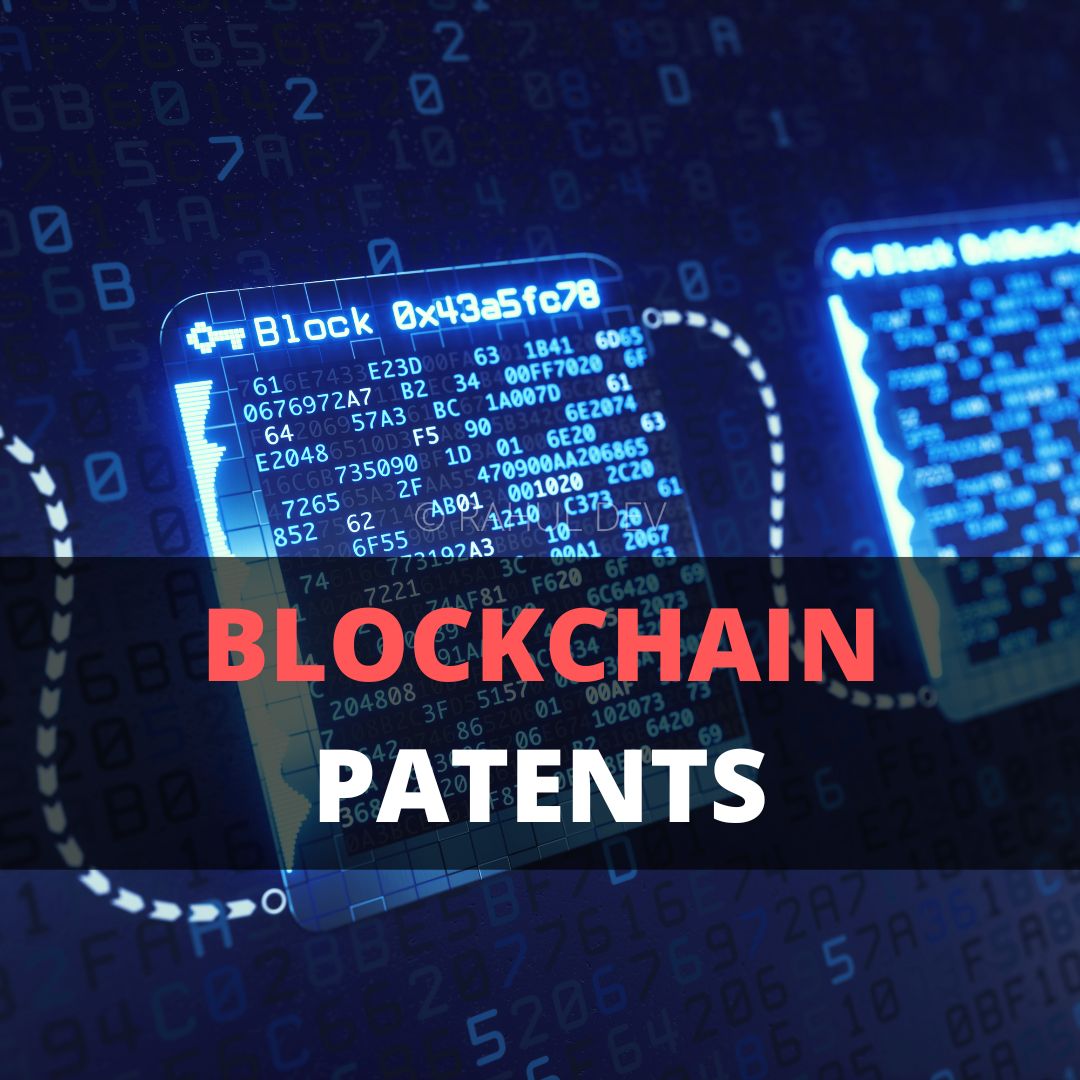Blockchain Technology
Blockchain technology is a transparent and secure digital ledger that provides the basis for patentable inventions. It was initially created to facilitate Bitcoin transactions – a digital currency where the transaction occurs virtually without the involvement of any single centralized party. As per researchers, Chinese entities had filed 4000+ blockchain patent applications in 2020 itself. It is due to the rise of blockchain technology (hereby referred to as ‘tech’) that people are coming up with different types of innovations. Before applying blockchain, inventors have to verify if a patent for blockchain technology is patentable in their country or not. Although many people still view blockchain technology as a speculative, risky, and unsafe investment, others feel it has already started to revolutionize the global economy. Filing blockchain patents add immense value for innovative blockchain startups during blockchain startup fundraising.
What is blockchain?
An immutable ledger to record transactions and track assets is known as the blockchain. Being a shared resource automatically helps in building trust. Most people are associated with blockchain terms owing to its association with cryptocurrency. In the transaction, each chain is represented as a block. Such blocks are verified, and then become a permanent part of this chain in the ledger. Several computers that host the blockchain verify the transactions. Hence, there is no requirement for a central authority. Blockchain does not come with the requirement of a mid-person as in the case of traditional transaction methods. Here, peer-to-peer interactions are responsible for conducting information authentication.

How does the blockchain function?
In the blockchain, the transfer of assets is represented by the transaction block. It includes data of the owner’s choice, such as who, what, and how, along with its condition. As this asset is transferred from one person to another, a chain of data is created. In this chain, each link will record the exact date and time of such a transaction. As no one can move backwards in the chain to modify the data of the previous block, not even a block can be inserted into a previously formed chain of data. Each link in this chain strengthens the security and validity of the chain. It’ll evident in the case of tempering occurs, hence making the blockchain secure. The blockchain has added a fundamental and secure layer to the infrastructure of the internet. It provides transparent, immutable, open, decentralized, global, and less-corrupt functionality. It is all about trust, governance, and value exchange.
Patent Protection for Blockchain Innovations
Blockchain creators often ponder ways to protect this technology. Many of them look forward to patenting this asset if it is non-obvious & novel and getting it drafted to avoid intangibility issues. There has been a rise in patent applications with the term ‘blockchain,’ yet more time is needed to calculate the accuracy of the success rate associated with blockchain patents. Utility patents form a large section of blockchain-related patent filing. Such patents cover features, processes, and functions related to this technology. Utility patents are responsible for protecting the unique combination of components utilized in running a blockchain platform. Many innovators also file design patents for blockchains responsible for displaying the user interface, icons, and layouts while accessing this platform.
Patent Eligibility in Different Countries
Patent laws admissible in various countries are responsible for clearly statutory subject-matter hurdles regarding patent protection of blockchains. A few such questions are regarding patent eligibility, whether they are inventive or useful, among others. For example, In the United States, blockchain inventions are prone to subject-matter scrutiny as per the Alice test. It asks if claims in filings are directed to patent-ineligible matters like an abstract idea. This test also examines elements of the claim to decide whether it consists of an “inventive concept” enough to “transform” the claimed abstract idea into an application eligible for a patent. Although computer codes or algorithms are considered non-patentable abstract ideas, this hurdle can be overcome by focusing on hardware processes and components that enable tech to function. In blockchain inventions, patent application details are to be drafted by specifying how tech is tied to physical elements like underlying hardware.
As per Canadian patent regulations, it is mandatory to highlight the strength of blockchain inventions and describe claimed features since large physical elements are directed toward a system, a methodology, or a computer-readable medium instead of the process of the mind or abstract formula. An innovation could be “any new and useful art, process, machine, manufacture, or composition of matter” but cannot be a scientific concept or mathematical formula. Other jurisdictions have similar patent regulations with some differences. A patent attorney is required to research legal tests for all jurisdictions and draft a single patent application that satisfies the requirements of all jurisdictions. To express blockchain innovation in terms that emphasize the ‘machine-like’ aspect of this tech innovation, patent attorneys are required to counsel clients from multiple jurisdictions while conducting due diligence of blockchain projects.
Key Characteristics of Blockchain
Blockchain can revolutionise industries and enable new business models. It provides a transparent, decentralised record of information that can be shared among several people without requiring their trust. The blockchain is an immutable digital ledger of transactions duplicated on thousands (or millions) of nodes throughout the world. Each node stores an exact copy of the ledger that is checked and updated list of all validated transactions participants using consensus procedures like proof-of-work (PoW). The network nodes approve and validate new blocks as ledger verifiers. This makes the system more secure and makes hacking harder.
The blockchain employs a consensus method to validate transactions. All parties agree on the same data, and no one can change it without consensus. A blockchain block makes transactions irreversible. A transaction is final and cannot be undone or modified. No third party can edit the records. This protects data. In a disagreement, you can compare a contract’s hash with the blockchain hash. Also, this makes transactions safer than traditional financial systems because hackers can’t alter or steal them to harm your account.
A blockchain is a decentralised database that lets consumers control their own assets. Decentralization means a distributed ledger has no single point of failure. All network transactions are recorded in the blockchain’s distributed ledger. This eliminates the requirement for a central authority or middleman to verify transactions. Anyone with an internet connection can view blockchains at any time. No one them individually. To keep things secure and accurate, everyone in the community shares transaction information. Blockchain is a breakthrough data-storage method. Blockchain provides uncompromisable digital security by building an immutable network of records. This technology could assist finance and healthcare, along with various other industries.
Leading Patent Owners of Blockchain Innovations
Apart from individuals applying for patents, many big companies apply for blockchain patents. Most of such applications are filed in China, where companies like CUNC, China, Baidu, Alibaba, and Ping, among others, are leading names for obtaining blockchain patents. From the US, companies such as IBM, Alibaba, Wal-Mart, Mastercard, and Bank of America are a few of the big names in blockchain patent filing.
Although blockchain technology is still in its infancy, patents related to this tech are slated to increase in the coming years. A few examples of blockchain patents that have been filed recently include Blockchain Object Deployment and Synchronization Across Blockchains by Microsoft, Cryptocurrency Payment Network by Square, Systems and Methods for Securing Cryptocurrency Purchases by Cornell University, Hybrid Blockchain by Accenture, Method and System for Linkage of Blockchain-Based Assets to Fiat Currency Accounts by Mastercard and more.
In addition to the crucial points stated here relating to blockchain patents, the future business models based on blockchain innovation may regularly need assistance for blockchain Patent Searching. The results of a patent search report for blockchain inventions and blockchain projects can assist in determining if Patent Drafting for blockchain inventions is the next step for blockchain International Patent Filing along with blockchain USPTO Patent Filing. In case of blockchain based business models adapted from blockchain, utility token Legal Opinion Letters may also be needed for blockchain projects, along with a set of applicable blockchaincontracts and blockchain agreements.
Our team of advanced patent attorneys assists clients with patent searches, drafting patent applications, and patent (intellectual property) agreements, including licensing and non-disclosure agreements.
Advocate Rahul Dev is a Patent Attorney & International Business Lawyer practicing Technology, Intellectual Property & Corporate Laws. He is reachable at rd (at) patentbusinesslawyer (dot) com & @rdpatentlawyer on Twitter.
Quoted in and contributed to 50+ national & international publications (Bloomberg, FirstPost, SwissInfo, Outlook Money, Yahoo News, Times of India, Economic Times, Business Standard, Quartz, Global Legal Post, International Bar Association, LawAsia, BioSpectrum Asia, Digital News Asia, e27, Leaders Speak, Entrepreneur India, VCCircle, AutoTech).
Regularly invited to speak at international & national platforms (conferences, TV channels, seminars, corporate trainings, government workshops) on technology, patents, business strategy, legal developments, leadership & management.
Working closely with patent attorneys along with international law firms with significant experience with lawyers in Asia Pacific providing services to clients in US and Europe. Flagship services include international patent and trademark filings, patent services in India and global patent consulting services.
Global Blockchain Lawyers (www.GlobalBlockchainLawyers.com) is a digital platform to discuss legal issues, latest technology and legal developments, and applicable laws in the dynamic field of Digital Currency, Blockchain, Bitcoin, Cryptocurrency and raising capital through the sale of tokens or coins (ICO or Initial Coin Offerings).
Blockchain ecosystem in India is evolving at a rapid pace and a proactive legal approach is required by blockchain lawyers in India to understand the complex nature of applicable laws and regulations.

